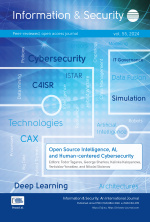Future Development of Quantum Computing and Its Relevance to NATO
Source:
Connections: The Quarterly Journal,Keywords:
complexity theory, cryptography, NATO, Quantum computing, quantum cybersecurity, quantum key distribution, quantum resilience, quantum supremacyAbstract:
The first quantum computers are becoming a reality, and scientists working in various areas look forward to taking advantage of their enormous computational potential. At the same time, the high performance of quantum computers imposes serious risks for cybersecurity. We can expect an arms race between rival parties: a defensive side trying to ensure the privacy and dependability of stored and transmitted information and their adversaries. With this article, the authors aim to provide an overview of the status of quantum computer development, project the next steps, and investigate the impact future quantum systems may have on cybersecurity and military operations. We first discuss the basic aspects that differentiate quantum computing from classical computing and find that analogies between both domains are quite limited. The world of quantum computers is remarkably diverse already, and we elaborate that quantum simulators and universal quantum computers have “qubits” in common but still work in fundamentally different ways. Since security experts focus on upcoming trends in quantum computing, we take a look at the latest technologies and at the race for first reaching “quantum supremacy.” Finally, we provide a detailed analysis of the specific risks future quantum computers represent for established cryptosystems and conclude that asymmetric algorithms like the RSA protocol are particularly vulnerable. The dangers of quantum computing for cryptography are obvious, as is the high relevance of the safety of stored and transmitted data to the defense sector. However, we examine the capability spectrum of quantum technologies and discover that breaking asymmetric encryption algorithms is just one facet, and other features like Grover’s quantum algorithm may revolutionize the logistics of the armed forces. Satellite Quantum Key Distribution is another promising concept that may change the communication between military units. To NATO, quantum computing is a double-edged sword: the alliance needs to use the developments to benefit from the potential and be ready to counter the cyber threats. We derive ideas of what NATO should do in order to prepare for the quantum era.
